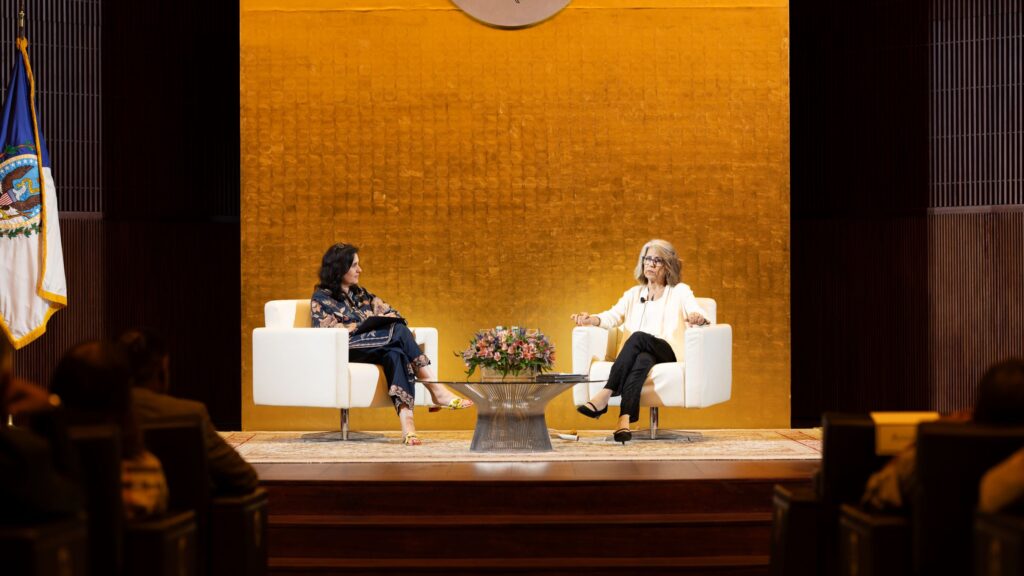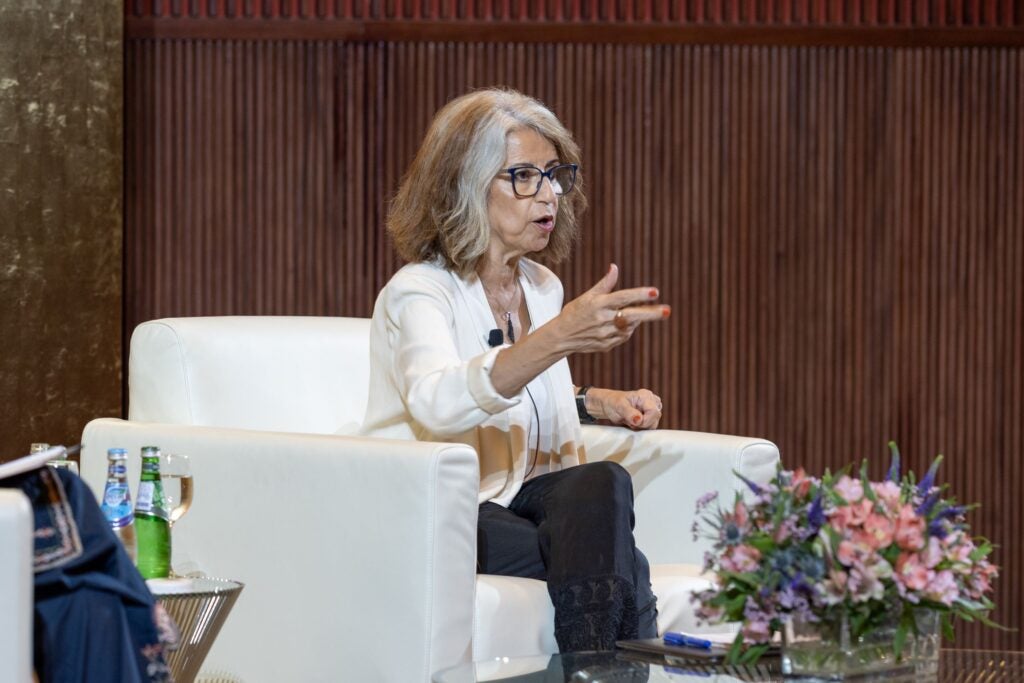Ahdaf Soueif Shares Her Journey to Literary Greatness and Political Agency at GU-Q’s Qalam Series

In a wide-ranging discussion hosted by Georgetown University in Qatar (GU-Q), internationally acclaimed novelist Kamila Shamsie and current GU-Q Writer-in-Residence discussed the writing process, the interplay of politics and cultural production, and maintaining values in the face of social change and unrest with celebrated writer, commentator, and activist, Dr. Ahdaf Soueif.
Dr. Soueif is a cultural and political commentator and activist who has been named one of Egypt’s most influential novelists by Harper’s Magazine. She writes about Egyptian and Palestinian politics and history through award winning fiction and non-fiction novels, short stories, and translations.
GU-Q’s inaugural Writer-in-Residence Kamila Shamsie, led the engaging discussion as part of GU-Q’s distinguished “Qalam” series. Shamsie, whose books Burnt Shadows and Home Fire have won multiple awards, honored Soueif’s impact on writers who came after, such as Shamsie herself, whose own first novel was published just a few weeks before Soueif’s Map of Love.
“The Map of Love was short-listed for the Booker Prize, translated into 30 languages, and sold a million copies. It is impossible to overstate what a very big deal it was…It was the book of the year, the one everyone was reading on the subway,” Shamsie recalled.
This in turn gave Soueif a prominent platform which she used to write about the second Infitada and the War on Terror in publications such The Guardian at a time when there were very few voices speaking in the Western media from the perspective of people from the region. Her reputation as a political commentator grew when she covered the Arab spring, first via journalism and later in the book Cairo: My City, Our Revolution. When asked to give advice to writers and activists today, she responded: “I would say speak out, don’t shout, and don’t compromise, and use any space that comes your way, but be true to what you actually believe.”
A former trustee of the British Museum, who resigned that position on ethical grounds, Soueif has always been committed to the role of culture in society. She spoke about her time spent in Doha in 2010 to produce an innovative book with Bloomsbury Publishing that gathered 25 prominent writers and intellectuals from different disciplines, and asked them to “fall in love with one piece” from the Museum of Islamic Art’s collection. The result was a confluence of Eastern and Western perspectives on the collection titled Reflections on Islamic Art.

“I thought this was an opportunity to bring interesting people and objects from both worlds together,” recalled Soeif, and the result was a volume that instead of reinforcing orientalist stereotypes about Islamic art offered insight on the importance of both art and Islam in the modern world.
At every stage of her career, Soueif has inspired others to try to make a difference through the example of her innovative fiction, her fearless non-fiction and her founding of the Palestine Festival of Literature which has taken hundreds of writers from around the world to Palestine since 2008.
Shamsie concluded the conversation by remarking on Soueif’s resilience and steadfastness in being a voice for the voiceless, saying: “I suppose that is the thing that strikes me, so often people do something one time and say, well it didn’t work and be dejected, and that’s not how you see the world.”
“No, I don’t like being defeated” Soueif replied, “If there is any room to maneuver through, one takes it.”
“See,” said Shamsie, turning to the audience with a smile, “this is why she is one of my heroes.”
Launched in September 2024, Qalam has previously brought such eminent literary voices to Qatar as Nobel Laureate Abdulrazak Gurnah and Pulitzer Prize-winning author Hisham Matar.
“Ahdaf Soueif looked right into the heart of late 20th century English fiction and saw the rules it had laid down about what made its great literature, and then she decided to upend them. Rules such as ‘leave politics out of the novel,’ and ‘all fiction must embrace individualism.’ When I think of Ahdaf as a fiction writer, I think of someone elegantly and determinedly breaching the fortifications that the English novel had built around itself…to let in light and air and give the novel space to come outside into the world. In breaching these fortifications, she is both rebel and heir to the throne.”
Kamila Shamsie

